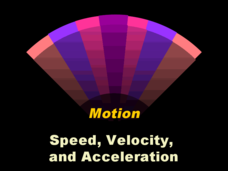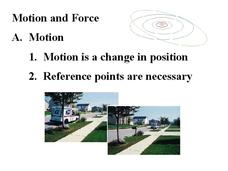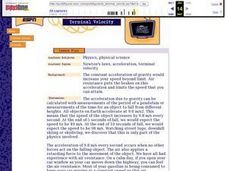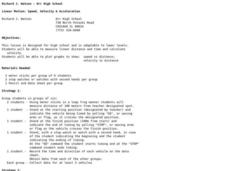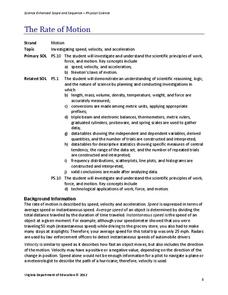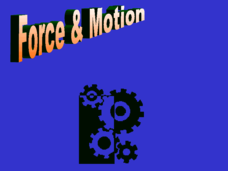Curated OER
Motion - Speed, Velocity, and Acceleration
Identical in appearance except for the information content, these 18 slides introduce young physicists to the concepts related to motion. Learning assessment questions are interspersed among sections of information on frame of reference,...
Curated OER
Velocity and Acceleration
Compliment your physics lesson with this PowerPoint which demonstrates many important points regarding acceleration and velocity. A starter experiment activity to stimulate student thinking is given, and may prove very interesting to a...
Curated OER
Motion Basics
Quiz those kids to assess what they've gleaned from your last lesson on Newton's laws of motion. There are 10 questions that have learners define force, acceleration, velocity, and speed. A bonus question has them write a motion story...
Curated OER
Motion and Force
Motion and force vocabulary words are concisely defined in this 13-slide PowerPoint. This is a great slideshow to review prior to a quiz for 5th or 6th grade science. Tip: Send this PowerPoint to your students so they can review it...
Curated OER
Motion and Force
All the main concepts in motion and force are covered in this presentation. Each slide is a great summary and will appeal to your students with a clean design and images that should seem relevant. Definitions of speed, displacement,...
Curated OER
Motion: Speed, Velocity, Acceleration and Networking
Students interpret a variety of motion graphs. In this physics lesson, students calculate the speed and acceleration of objects using numerical data from graphs. They apply what they have learned to solve real world problems.
Curated OER
Unit IX: Worksheet 2 - Impulsive Force
Here are nine motion problems for physics fanatics to solve. Topics are pretty typical: rifles firing bullets, freight train cars colliding, astronauts gliding through space, balls being thrown. Pupils compute recoil speed, combined...
Curated OER
What is Motion?
Prior to beginning a math or physical science lesson on motion, use this presentation to define the concepts of motion, rate, velocity, and speed. This resource lacks concrete examples but could be useful as discussion starter.
Curated OER
Terminal Velocity
Students calculate acceleration due to gravity with the measurements of the period of a pendulum or measurements of the time for an object to fall from different heights. They observe and measure the effect of air resistance on the...
Curated OER
Linear Motion: Speed, Velocity & Acceleration
Learners explore the concept of linear motion. For this linear motion lesson, students calculate distance and time in order to calculate average speed and velocity in the provided problems.
Virginia Department of Education
The Rate of Motion
How much time does it take to jump over three balloons? Pupils calculate the speed of tasks that require different motions. They determine motions for tasks such as walking, skipping, hopping, and jumping before creating a spreadsheet...
Curated OER
Motion Problems
In this motion worksheet, students complete motion word problems where they explain and define issues having to do with motion. Students complete 32 problems.
Curated OER
Force and Motion
Each of the slides here gives a definition, equation, or calculation example for a component of force and motion. This large collection covers topics from momentum and Newton's laws to centripetal forces and simple machines. Animations...
Curated OER
Unit IX: Worksheet 3 - Impulsive Force
Eight motion-related problems are contained in this physics assignment. Upcoming physicists calculate combined velocity after collisions, impulse, and momentum. They also address critical thinking situations, making this a well-rounded...
Curated OER
Tracking Speed
High schoolers calculate the speed of an object, by measuring the amount of time it takes to cover a given distance, and then divide: speed=distance/time. However, the object may not have been moving at a constant rate over the given...
Mr. E. Science
Motion
An informative presentation covers motion, metric system, conversions, graphing of coordinates and lines, speed, velocity, and acceleration problems, as well as mean calculations. This is the first lesson in a 26-part series.
Curated OER
Speed
Fifth and sixth graders practice working in pairs to determine whether they can walk with constant speed. They test themselves, collect their data, draw graphs with their data collected, manipulate the data, and then draw conclusions...
Curated OER
Motion
Sixth graders read about and study motion. They conduct a lab in which they calculate speed using track records at their school. They graph the results and then invite a guest speaker (an officer from the local police department) who...
Curated OER
Unit II: Worksheet 1 - Velocity
Beginning physics scholars interpret two graphs depicting position versus time. For each graph, there is a series of questions to answer. The exercise is basic, but beneficial. Consider using it as an assessment of understanding after...
Curated OER
Unit II: Worksheet 2 - Velocity vs. Time Graphs
On the first of two pages, physics aces graph velocity versus time on sets of axes. On the second page, they look at graphs of position versus time and then draw velocity versus time on graphs right next to them. This is good practice in...
Curated OER
Unit II: Worksheet 3 - Velocity
Future engineers analyze the motion of Robin, the roller skater, as he moves along a sidewalk. They graph the position versus time for three different occurrences. Questions are asked about the resulting graphs, reinforcing the concepts...
Curated OER
Unit VI: Worksheet 3 - Force, Velocity, Displacement
Those who take this challenge will draw force diagrams and then calculate velocities and displacement. The problems are applicable to any general physics curriculum that covers motion. Add this to your collection of homework selections.
Curated OER
Position, Velocity & Acceleration vs. Time
For this motion worksheet, students use a graph showing the velocity of an object over time to describe the motion of the object and to determine the position of the object at different intervals. Then students create speed vs. time and...
Curated OER
"Measurement in Motion"
Ninth graders examine the rate of motion and changes in motion using a ramp and a rolling object. They conduct the demonstration, determine the average speed, and describe how a moving object can have zero acceleration and deceleration.


